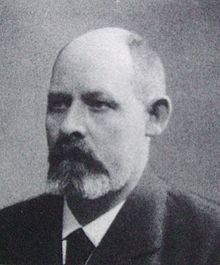Fredrik Vilhelm Thorsson
| Fredrik Vilhelm Thorsson | |
|---|---|
 |
|
| Minister for Finance | |
|
In office January 5, 1918 – June 30, 1920 |
|
| Prime Minister |
Nils Edén Hjalmar Branting |
| Preceded by | Hjalmar Branting |
| Succeeded by | Rickard Sandler |
|
In office October 13, 1921 – April 19, 1923 |
|
| Prime Minister | Hjalmar Branting |
| Preceded by | Jacob Beskow |
| Succeeded by | Jacob Beskow |
|
In office October 18, 1924 – May 5, 1925 |
|
| Prime Minister |
Hjalmar Branting Rickard Sandler |
| Preceded by | Jacob Beskow |
| Succeeded by | Ernst Wigforss |
| 1st Minister for Trade | |
|
In office July 1, 1920 – October 27, 1920 |
|
| Prime Minister | Hjalmar Branting |
| Preceded by | Post created |
| Succeeded by | Gösta Malm |
| Personal details | |
| Born | 30 May 1865 Stora Köpinge socken, Malmöhus County |
| Died | 5 May 1925 (aged 59) Ystad |
| Political party | Social Democrats |
Fredrik Vilhelm Thorsson (30 May 1865 – 5 May 1925) was a Swedish politician and shoemaker. He was Minister for Finance during three separate periods (1918–1920, 1921–1923, and 1924–1925), and Minister for Trade in 1920.
Fredrik Vilhelm Thorsson came from humble working conditions. He was the son of shoemaker Nils Thorsson Viktor and Amalia Charlotta Pihlström. At the age of nine, he became an orphan, and was looked after by the parish officers and sold at child auction, where they offered children at sale. That he would follow in his father's footsteps and be trained to cobbler was obvious; his journeyman he undertook, inter alia, in Copenhagen when he received a journeyman's certificate in Ystad. As a shoemaker, he worked in , Uppsala and Sundsvall. In doing so, he began to agitate for improved conditions for the workers. Then he became known as a prominent figure of the Scanian Socialists, he boycotted by several employers and returned to his home town, Ystad, where he opened a shoemaker with his partner Anders Nordstrand.
In 1889, Thorsson was employed by the Social Democratic Party in southern Sweden as an agitator, and proved to be quite talented. In 1897 he campaigned against C. G. Ekman, which resulted in several trade unions affiliating themselves with the social democratic movement.
Thorsson was elected to the Lower House of the then bicameral Parliament of Sweden in 1902, and was regarded as the most radical of the Social Democrats. In the parliament he won a debate against the State Committee, a powerful group in the bicameral parliament, regarding the sale of state property. In 1909 he became a member of the State Committee, then headed by Karl Staaf, with special responsibility for the military defence, and was also appointed Deputy Chairman of the Parliamentary Trustees. In contrast to other left-wing politicians in the parliamentary group, he was positive to the military defence. He was a member of the State Committee until 1917. In 1914 he became a member of the govering board of the Swedish National Bank and re-elected in 1917. In 1918, he became Minister for Finance in Nils Edén's cabinet, a coalition between Liberals and Social Democrats, when Hjalmar Branting had resigned as Minister for Finance. He then implemented a budget reform and drafted proposals for council tax reforms.
...
Wikipedia
